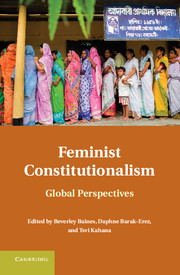Book contents
- Frontmatter
- Contents
- Foreword
- Contributors
- Introduction
- Part I Feminism as a Challenge to Constitutional Theory
- Part II Feminism and Judging
- Part III Feminism, Democracy, and Political Participation
- Part IV The Constitutionalism of Reproductive Rights
- 14 Pregnancy, Equality, and U.S. Constitutional Law
- 15 Federal Spending and Compulsory Maternity
- 16 Challenges for Contemporary Reproductive Rights Advocacy
- Part V Women's Rights, Multiculturalism, and Diversity
- Part VI Women between Secularism and Religion
- Index
- References
15 - Federal Spending and Compulsory Maternity
Published online by Cambridge University Press: 05 June 2012
- Frontmatter
- Contents
- Foreword
- Contributors
- Introduction
- Part I Feminism as a Challenge to Constitutional Theory
- Part II Feminism and Judging
- Part III Feminism, Democracy, and Political Participation
- Part IV The Constitutionalism of Reproductive Rights
- 14 Pregnancy, Equality, and U.S. Constitutional Law
- 15 Federal Spending and Compulsory Maternity
- 16 Challenges for Contemporary Reproductive Rights Advocacy
- Part V Women's Rights, Multiculturalism, and Diversity
- Part VI Women between Secularism and Religion
- Index
- References
Summary
Congress has long had the power to spend for the general welfare as well as the authority to attach conditions that the recipient, whether state or individual, must accept to receive the funds. The Court's major decision regarding conditional spending, South Dakota v. Dole, focused on the federal–state relationship in setting forth a test for understanding the constitutional boundaries limiting Congress's ability to place conditions on funds. That benchmark facilitated a disconnect, however, that analytically separates the individual from the conditional spending program, a divide that allows Congress to impinge on individual rights when it could not otherwise do so.
An example of this disconnect is found in the Court's decisions allowing state and federal governments to burden the privacy right to obtain abortion by withholding funds in public health-care programs, particularly Medicaid. The import of programs such as Medicaid cannot be overstated, but using their power to blockade exercise of constitutionally protected rights demands consideration of the individual affected by the legislative conditions accepted by the state. This role of the third party is played not only by women, but also by physicians and other health-care providers who are most affected by conditions on spending. Together, they highlight the gap that exists between conditional spending jurisprudence and the impact conditional spending has on individuals participating in federal health-care programs (and sometimes individuals with private insurance).
- Type
- Chapter
- Information
- Feminist ConstitutionalismGlobal Perspectives, pp. 281 - 297Publisher: Cambridge University PressPrint publication year: 2012



